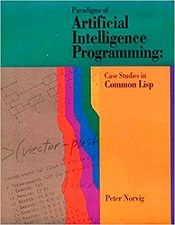
|
FreeComputerBooks.com
Links to Free Computer, Mathematics, Technical Books all over the World
|
|
- Title: Paradigms of Artificial Intelligence Programming: Case Studies in Common Lisp
- Author(s) Peter Norvig
- Publisher: Morgan Kaufmann; 1 edition; eBook (MIT Licensed, 2018)
- License(s): MIT License
- Paperback: 946 pages
- eBook: PDF
- Language: English
- ISBN-10: 1558601910
- ISBN-13: 978-1558601918
- Share This:

|
This book is an overview of classical artificial intelligence (AI) programming via actual implementation of landmark systems (case studies). For the student interested in AI, Paradigms of Artificial Intelligence Programming is an invaluable history lesson. Even the programmer who is relatively uninterested in AI will find value in the book's basic introduction to Lisp and case studies written in Lisp.
This is the first text to teach advanced Common Lisp techniques in the context of building major AI systems.
By reconstructing authentic, complex AI programs using state-of-the-art Common Lisp, the book teaches students and professionals how to build and debug robust practical programs, while demonstrating superior programming style and important AI concepts.
It teaches advanced Common Lisp techniques in the context of building major AI systems. By reconstructing authentic, complex AI programs using state-of-the-art Common Lisp, the book teaches students and professionals how to build and debug robust practical programs, while demonstrating superior programming style and important AI concepts.
The author strongly emphasizes the practical performance issues involved in writing real working programs of significant size. Chapters on troubleshooting and efficiency are included, along with a discussion of the fundamentals of object-oriented programming and a description of the main CLOS functions.
This volume is an excellent text for a course on AI programming, a useful supplement for general AI courses and an indispensable reference for the professional programmer.
About the Authors- Peter Norvig is an American computer scientist. He is a director of research at Google Inc., and used to be its director of search quality.
- Artificial Intelligence and Logic Programming
- LISP and Common LISP Programming
- Machine Learning

- Neural Networks and Deep Learning
- Algorithms and Data Structures

- Paradigms of Artificial Intelligence Programming: Case Studies in Common Lisp (Peter Norvig)
- The Mirror Site (1) - PDF
-
 Applied AI for Enterprise Java Development (Alex Soto Bueno, et al.)
Applied AI for Enterprise Java Development (Alex Soto Bueno, et al.)
For Java enterprise developers and architects looking to expand their skill set into artificial intelligence and machine learning (AI/ML), getting started can feel intimidating, especially when faced with complex theory, data science, and unfamiliar programming languages.
-
 Unlocking Artificial Intelligence: From Theory to Applications
Unlocking Artificial Intelligence: From Theory to Applications
A state-of-the-art overview of current machine learning research and its exploitation in various application areas. Deep integration of artificial intelligence (AI) methods in products and services is essential for companies to stay competitive.
-
 Thinking with AI: Machine Learning the Humanities (Hannes Bajohr)
Thinking with AI: Machine Learning the Humanities (Hannes Bajohr)
This open access book explores a novel approach to the intersection of artificial intelligence and the humanities, proposing that instead of merely writing about AI, scholars should think with AI.
-
 Applied Artificial Intelligence: A Handbook For Business Leaders
Applied Artificial Intelligence: A Handbook For Business Leaders
This book is a practical guide for business leaders who are passionate about leveraging machine intelligence to enhance the productivity of their companies and the quality of life in their communities.
-
 The Road to General Intelligence (Jerry Swan, et al.)
The Road to General Intelligence (Jerry Swan, et al.)
In this book, the authors argue that the framework of machine learning is fundamentally at odds with any reasonable notion of intelligence and that essential insights from previous decades of AI research are being forgotten.
-
 Artificial Intelligence - Intelligent Art?
Artificial Intelligence - Intelligent Art?
As algorithmic data processing increasingly pervades everyday life, it is also making its way into the worlds of art, literature and music. In doing so, it shifts notions of creativity and evokes non-anthropocentric perspectives on artistic practice.
-
 Artificial Intelligence and Librarianship (Martin Frické)
Artificial Intelligence and Librarianship (Martin Frické)
Generative AI is an important new area for librarianship. This book provices an introduction to AI, principally in relation to large language models, then related to librarianship, particularly to roles that librarians might assume in the near future.
-
 Generative AI in Higher Education: The ChatGPT Effect
Generative AI in Higher Education: The ChatGPT Effect
Provide a comprehensive examination of the use and impact of ChatGPT and Generative AI (GenAI) in higher education. Introduce the Six Assessment Redesign Pivotal Strategies (SARPS) and an AI Assessment Integration Framework.
-
 Art Intelligence: How Generative AI Relates to Human Art-Making
Art Intelligence: How Generative AI Relates to Human Art-Making
What impact will Generative AI (GenAI) have on how we create art and how we understand what art is for? How will it affect the role of the artist in the future and the conditions under which artists will work?





